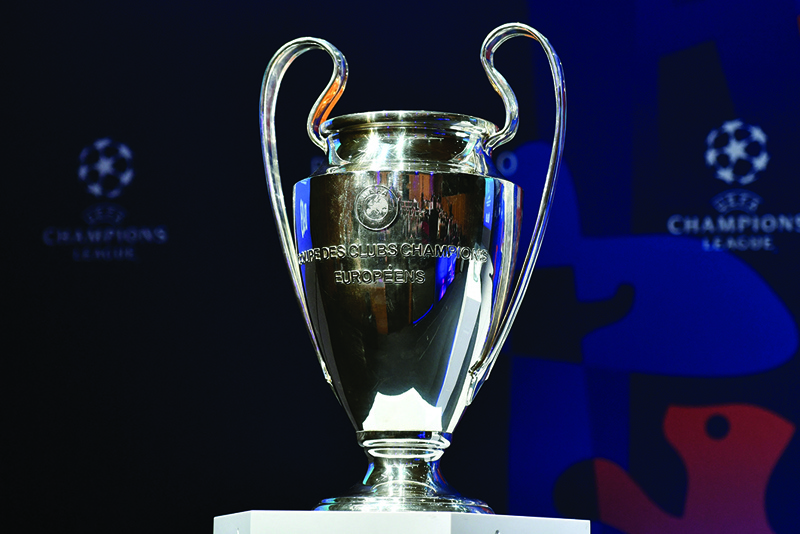 NYON: In this file photo taken on March 15, 2019, the UEFA Champions league trophy is exhibited ahead of the draw for the Champions league quarter-final draw, at the House of European football in Nyon. - AFP
NYON: In this file photo taken on March 15, 2019, the UEFA Champions league trophy is exhibited ahead of the draw for the Champions league quarter-final draw, at the House of European football in Nyon. - AFP
MONTREUX: UEFA on Monday confirmed that a new format for the Champions League will be introduced from 2024 with the number of clubs in the group stage increasing from 32 to 36, despite an earlier announcement that 12 major clubs were planning to break away and start a rival Super League. The new format -- which will see all 36 clubs brought together into one pool instead of the current system of four-team groups -- was approved at an executive committee meeting of European football's governing body in Switzerland.
No announcement was made about how the four extra teams would qualify other than that one place would go to the fifth-ranked league in Europe, which is currently France. The announcement came hours after news broke of a proposed breakaway Super League which was met with an acid response from UEFA president Aleksander Ceferin.
"I cannot stress more strongly how everyone is united against this disgraceful, self-serving proposals, fuelled by greed above all else," said Ceferin. "We are all united against this nonsense of a project. Cynical plan, completely against what football should be. We cannot and will not allow that to change."
UEFA's new-look Champions League will follow the so-called 'Swiss system', more commonly associated with chess, with clubs split into four pots of nine for the draw based on UEFA coefficients. Teams will play against 10 different sides, with five games at home and five away.
At the end of this phase, the top eight sides will go through to the last 16, with the bottom 12 eliminated. Meanwhile, the sides finishing between ninth and 24th position will play two-legged play-offs, with those between ninth and 16th drawn against a side finishing from 17th to 24th. The winners of those ties will complete the last-16 line-up, with the losers dropping into the Europa League.
Hos cities
Meanwhile, UEFA said it would announce the final decision over the host cities for this year's delayed Euro 2020 on Friday, with Munich, Bilbao and Dublin in danger of being dropped from the list if the trio cannot welcome spectators to stadiums. On Monday, Ceferin said European football's governing body "postponed our final decision until Friday" to allow time for final discussions "with the three cities which could be excluded".
Munich, Bilbao and Dublin were all given until Monday to provide UEFA with additional information on their plans for spectators, with that deadline now extended. UEFA could take matches due to be played there and relocate them to other existing host cities, although the president of the Spanish Football Federation, Luis Rubiales, has said he will do "everything humanly possible" to ensure Spain keeps its four scheduled Euro games.
Postponed by a year due to the pandemic, the European Championship is set to start in Rome on June 11 and is supposed to be played at 12 different venues spread across the continent, a controversial arrangement even before the pandemic brought about widespread travel restrictions.
The Italian capital was only confirmed as a host city last Wednesday when local authorities confirmed spectators would be allowed in up to 25 percent of the capacity of the 68,000-seat Stadio Olimpico. It joins eight other cities -- Saint-Petersburg, Baku, Budapest, Amsterdam, Bucharest, Copenhagen, Glasgow and London -- in being confirmed, although the number of fans allowed into stadiums will vary from one venue to the other. - AFP










